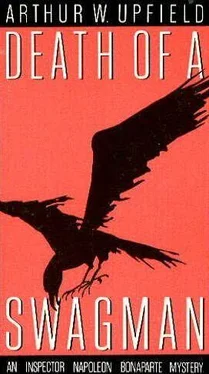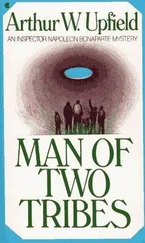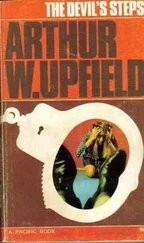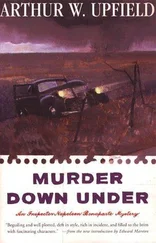Arthur Upfield - Death of a Swagman
Здесь есть возможность читать онлайн «Arthur Upfield - Death of a Swagman» весь текст электронной книги совершенно бесплатно (целиком полную версию без сокращений). В некоторых случаях можно слушать аудио, скачать через торрент в формате fb2 и присутствует краткое содержание. Жанр: Классический детектив, на английском языке. Описание произведения, (предисловие) а так же отзывы посетителей доступны на портале библиотеки ЛибКат.
- Название:Death of a Swagman
- Автор:
- Жанр:
- Год:неизвестен
- ISBN:нет данных
- Рейтинг книги:4 / 5. Голосов: 1
-
Избранное:Добавить в избранное
- Отзывы:
-
Ваша оценка:
- 80
- 1
- 2
- 3
- 4
- 5
Death of a Swagman: краткое содержание, описание и аннотация
Предлагаем к чтению аннотацию, описание, краткое содержание или предисловие (зависит от того, что написал сам автор книги «Death of a Swagman»). Если вы не нашли необходимую информацию о книге — напишите в комментариях, мы постараемся отыскать её.
Death of a Swagman — читать онлайн бесплатно полную книгу (весь текст) целиком
Ниже представлен текст книги, разбитый по страницам. Система сохранения места последней прочитанной страницы, позволяет с удобством читать онлайн бесплатно книгу «Death of a Swagman», без необходимости каждый раз заново искать на чём Вы остановились. Поставьте закладку, и сможете в любой момент перейти на страницу, на которой закончили чтение.
Интервал:
Закладка:
“That will be lovely. I’ve always wanted to meet him. But… I think I’d better not go to the service. There will be supper to prepare.”
“I said that you would be going to the service,” insisted Bony. “You see, Mrs Marshall, I am taking Rose Marie, and in view of my present social status it would be proper if you chaperoned us.”
Mrs Marshall hesitated, smiled, and assented.
“It beats me,” snorted her husband.“Easy victory! If it had been me there would have been yells and screams about not having had sufficient notice, and this and that.”
His wife smiled at him affectionately and said:
“You’d better behave yourself, young man.”
“I’m trying to in spite of my hunger.”
“Well, then, sit down. I’ll call Rose Marie.”
“Let me,” requested Bony and with the freedom of a member of the household he passed to the “front room”, where Rose Marie was courageously working and wondering when on earth her mother would release her from durance vile.
“Oh!” she exclaimed when Bony came silently to stand at her side.
“You play very nicely,” he told her. “I’ve been listening to you. Dinner is waiting, and here are my wages for today for you to put into your box. Is your dress all ready for church tomorrow?”
“Yes. Mother ironed it this afternoon. And your clothes too?”
“And have you decided what to say to Miss Leylan’s sweetheart?”
“No… I haven’t. What shall I say, Bony?”
“The first thing that enters your head.”
For this Marshall family Bony had come to have an affectionate regard. Beneath his official exterior Marshall himself was a kindly man and generous in his outlook to everyone, a good husband to a woman who gave as well as accepted, and matched his sense of humour, and a father who had an enormous and secret pride in his daughter, in whom quaintness and precociousness were due to the undisputed place she occupied in their hearts. Mrs Marshall was one of those rare women who seem incapable of finding any fault in any person. And in both her husband and Bonaparte she had good companions.
The following evening, dressed in a grey frock and velour hat, she called on Bony to tell him it was time for church and that her mother was waiting.
“Do you think I look nice?” she asked him.
“I think you are adorable, Rose Marie, and I am sure that Mr Lawton-Stanley will think so too. Do I look all right enough for church?”
“Of course,” replied Rose Marie.
Together they crossed the open space to the front of the police station, where Mrs Marshall waited. The sergeant accompanied them as far as the front gate, and Mrs Marshall told him:
“Don’t let the fire go out, Father, and don’t stoke it up so that the house will be a furnace by the time we get back.”
“I’ll do my best,” he promised, and stood watching them walking down the street, Bony on the outside and Rose Marie walking sedately between him and her mother. He reckoned he had known a number of good half-castes in histime, and a lot of white men too, but not a man approaching the one who was taking his wife and daughter to church.
There were some thirty people already within the building when Rose Marie led her mother and Bony into a pew. Bony recognized Mrs Fanning with her husband, and Mrs Sutherland with her two boys. Mrs Sutherland rose and came to them to whisper a few words of welcome. Her girlishfigure was moulded into a black gown, both gown and figure sufficient to make envious any girl of seventeen.
Soon after she had gone back to her pew, Mrs James emerged from the vestry and went up to the pulpit with a sheaf of papers which she placed on the reading desk and weighted with a block of white marble. Her short-skirted costume seemed to emphasize the slenderness of her body, which, however, radiated energy in every quick and purposeful movement.
Rose Marie nudged Bony’s elbow and he, looking down at her, followed the direction of her eyes and saw Edith Leylan and Lawton-Stanley walking down the far aisle to a large family pew. The girl walked easily. She was plainly but expensively dressed, and it did not appear strange to either Bony or Lawton-Stanley that many of the women present dressed with better taste than the average city women. Lawton-Stanley wore laymen’s clothes. He was six feet tall and his well-knit, lean body was perfectly balanced on his feet. His features were slightly sharp and on the bridge of his long, straight nose were rimless pince-nez. They could only see his face in profile, strong, open, and clean, and lighted by a lamp of inner joy.
Covertly Bony glanced down at Rose Marie, to observe her flushed cheek and one very wide and bright grey eye, and he whispered:
“What do you think?”
“He’s just lovely,” she replied.
Mrs James, having prepared the pulpit, passed down the steps to the church floor, and then crossed to welcome Lawton-Stanley. Bony could see that she was being torn by two opposingforces, that opposed to her desire to welcome the bush evangelist being the great enemy Time. Three minutes later she emerged from a side door into the choir gallery, seated herself at the organ, and began to play. The gallery filled up with senior boys and girls of the Sunday school.
The Rev. Llewellyn James entered from the vestry. He was arrayed in his black crepe gown and moved with ponderousness in contrast to the lightness of his wife. When he mounted the pulpit steps he appeared to haul himself upward by a hand upon the single banister. The organist ceased playing. The minister stood up and removed the marble block from the sheaf of papers. He picked up the top one and announced the opening hymn without any warmth in his voice.
Mrs James played the opening bars and led the choir. Bony could not hear her voice but he knew that she was singing with all her might. Her head was held well back, her face lifted so that she must have been looking high at the organ pipes and not at the music.
It became plain that the Rev. Llewellyn James was an automaton. The entire service was set out for him on that sheaf of papers placed by his wife in the pulpit. The hymn numbers were there. The prayers were there for him to read. The passages of Scripture were marked ready for him in the Book. And from the sheaf of papers he read his sermon. His voice was strong and his enunciation good, but that was spoiled by the overlaying nasal whine and the ending of every sentence on too high a note, which became monotonous. He was as lacking in spiritual warmth as was the block of marble on his desk.
After the service the Rev. Llewellyn James hurried from his pulpit to the vestibule to speak a few parting words with members of his congregation. His wife remained at the organ. Bony, with his two ladies, left before Edith Leylan and her escort, Mr James shaking hands with Mrs Marshall and giving Rose Marie a pat on the shoulder. He stared at Bony and said not a word.
“He might have spoken to you,” Mrs Marshall remarked.
“I find it hard to blame him for being speechless,” Bony said gravely. “After all, he has reason for being astonished at a known jailbird taking to his church the wife and daughter of Merino’s senior police officer. Even to me, it doesn’t all seem to square. Ah, here comes Lawton-Stanley.”
The bush evangelist’s expressive hands were held out to clasp Bony’s shoulders.
“Bony!” he said slowly, and then went on at quicker tempo: “I never thought to see you in this part of the continent. You are looking well.”
“I am feeling better than I did two minutes ago, Padre. Oh, good evening, Miss Leylan. You remember me, I hope. We met on the Walls of China.”
“I remember you, of course,” she said gaily. “But just fancy you two knowing each other.”
Читать дальшеИнтервал:
Закладка:
Похожие книги на «Death of a Swagman»
Представляем Вашему вниманию похожие книги на «Death of a Swagman» списком для выбора. Мы отобрали схожую по названию и смыслу литературу в надежде предоставить читателям больше вариантов отыскать новые, интересные, ещё непрочитанные произведения.
Обсуждение, отзывы о книге «Death of a Swagman» и просто собственные мнения читателей. Оставьте ваши комментарии, напишите, что Вы думаете о произведении, его смысле или главных героях. Укажите что конкретно понравилось, а что нет, и почему Вы так считаете.












